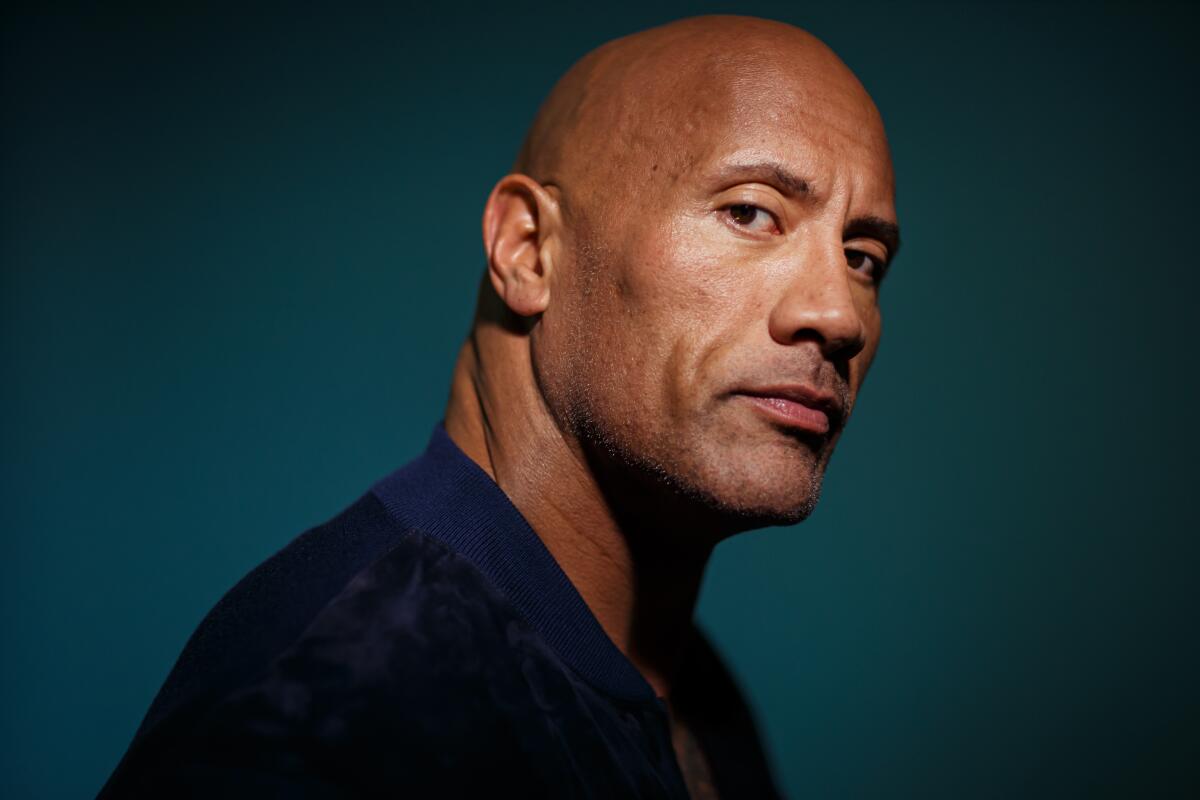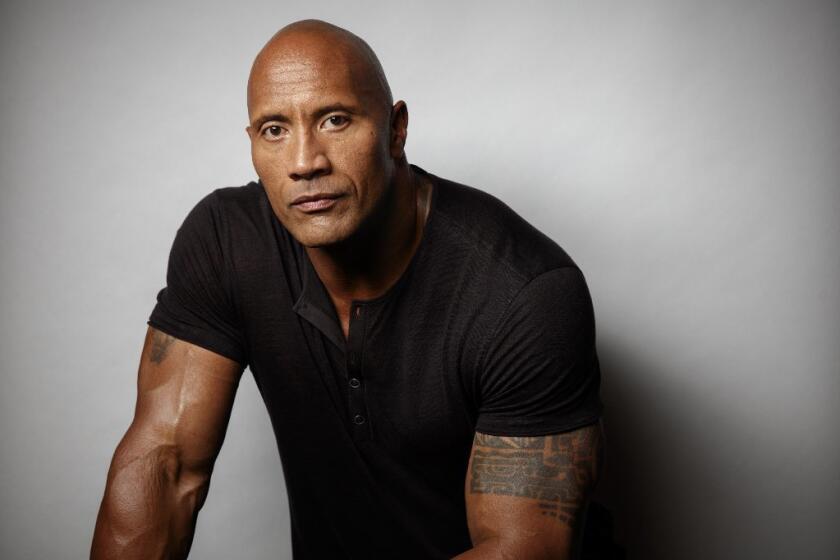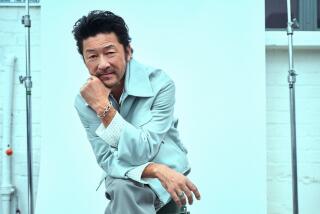Dwayne Johnson brings Samoan heritage to ‘Fast and Furious’ spinoff ‘Hobbs and Shaw’

The day Dwayne Johnson’s mother came to visit the Kauai set of “Fast & Furious Presents: Hobbs & Shaw,” emotions were already high. But not even the WWE superstar known in the ring as The Rock was steeled for what he saw after director David Leitch called “Cut!” on one of the most pivotal scenes in the “Fast & Furious” spinoff.
Johnson, in character as Luke Hobbs, the brawny American lawman he’s played since “Fast Five,” had just led an ensemble of fellow Polynesian actors, including Cliff Curtis and WWE’s Roman Reigns, in a siva tau, or Samoan war dance.
This siva tau was special, created specifically for the film with the aid of Samoan cultural consultants. And as a sacred cultural tradition, Johnson told Leitch it warranted sensitivity. With this in mind, Leitch filmed only a few takes rather than the countless coverage angles typical of a blockbuster shoot of this size and scale.
The scene serves as the crackling prelude to a sequence in which Hobbs and his estranged brothers reconcile to face down a threat to humanity as they know it, by daisy-chaining a row of speeding, tricked-out vintage trucks to a helicopter while careening along the edge of a cliff (well, it is a “Fast & Furious” movie). In it, Johnson’s Hobbs, his traditional tattoos glistening under the night sky, roars alongside his brothers in arms, calling upon their ancestors.
“I look over and she is bawling,” Johnson says, grinning as he recounts the moment during a recent stop in Los Angeles. “The mama’s doing the ugly cry! I didn’t show her any rehearsals. She’s never heard me speak in Samoan to that extent. As I’m calling, I’m speaking to God and to atua, and we start our movements and I say, ‘This will be the last face you see before you die,’ and she’s bawling.
“After the take — it’s so beautiful and I’ll never forget this — all the guys go over to her,” he added. “‘Oh, Mama, are you okay?’ and give her hugs.”
Dwayne Johnson knows how moviegoers want to see him. Strong — as in physically imposing.
Johnson, 47, has starred in more than a dozen $100 million-plus domestic grossing hits, including “Rampage,” “San Andreas,” “Jumanji: Welcome to the Jungle,” four “Fast” sequels and the Disney animated film “Moana,” in which he voiced Maui, a legendary Polynesian demigod. This “Hobbs & Shaw” scene, though, felt far more personal in many ways. He kept the siva tau under wraps from his mother, Ata Johnson, until filming. It was the most she had ever heard him speak in Samoan.
“There is a word in Polynesian language, mana — which is like spirit and soul and power — and the mana was so real on set,” he said. “We’re in the islands, we’re on sacred ground to begin with.”
In the first of several potential additional spinoffs to branch out from Universal’s $5-billion global hit franchise, Johnson has helped write his own heritage into one of the biggest action series on the planet. Introducing the film at its Los Angeles premiere, Johnson shared a startling fact: “Hobbs & Shaw” is the first film of its scale, and one of only a handful of films period, to showcase the Samoan culture and setting in this way.
“It was our way of paying homage and honoring a culture that I’m very proud of, and that has been responsible for teaching me defining values throughout the years,” he told The Times a few days later ahead of a whirlwind press tour.
“We always want the films to be reflective of the world, culturally,” said producer, screenwriter and “Fast and Furious” architect Chris Morgan, noting that inclusivity has been both organic and essential to the multicultural Universal franchise. “You get the sense that if the audience were transported into that world, that crew would accept them. All of them. For me, the greatest thing about the ‘Fast’ films are that they represent global culture, positivity, family, heroism and that sense of inclusion and belonging. It’s what makes it special, and if you didn’t have that it wouldn’t be ‘Fast.’ ”
Spinoff chemistry
Johnson and Jason Statham reprise the characters they’ve played in several installments of the “Fast” cinematic universe. But while the never-mentioned Dominic Toretto is presumably living his life a quarter mile at a time elsewhere in the world — Justin Lin is currently directing “Fast 9,” with an ensemble anchored by original “Fast and Furious” stars Vin Diesel and Michelle Rodriguez — “Hobbs & Shaw” takes the audience on a two-hander adventure from Shaw’s hometown of London to Hobbs’ childhood home in Samoa, with a stop for intrigue and over-the-top action in a secretive Chernobyl bunker.
Directed by stunt pro-turned-helmer Leitch (“Atomic Blonde,” “Deadpool 2”) and written by Morgan and Drew Pearce, the story tracks Johnson’s Hobbs and Statham’s British former black ops baddie Deckard Shaw as they reluctantly team up to take on Idris Elba’s Brixton Lorr, a cybernetically enhanced super soldier trailing Shaw’s MI6 spy sister Hattie (Vanessa Kirby), who is in possession of a dangerously powerful biological weapon.
In addition to new characters and deeper backstories, the spinoff moves into action-comedy territory, punctuated by zippy exchanges and surprise cameos. Johnson extended an arm wide as he does in one of the film’s most heightened action scenes, reaching for an invisible tether. “If I’m going to hold a helicopter by a chain and pull it back in,” he said, “as a fan of movies and a fan of heroic characters ... I need Hobbs to have winking absurdity.”
Like the genre twists and turns the “Fast and Furious” movies have taken over the course of 18 years, “Hobbs & Shaw” aims to differentiate itself from the central films that have themselves evolved from their humble origins: Over eight films, what began as a humbly bromantic tale of testosterone-fueled L.A. street racers turned into into a turbo-charged, globe-trotting franchise filled with flying cars, physics-defying stunts and international espionage.
One enduring concept has famously remained at the core of the Vin Diesel-led “Fast and Furious” blockbusters since 2001, through quarter-mile races, torrid bromances, international adventures and high-stakes heists: family.
The franchise’s first spinoff also had to be able to stand on its own. According to Johnson, talks began loosely after the star joined the cast of 2011’s “Fast Five” and helped make the film a hit. But he said it took several more years to find a story worth telling. The studio’s goal, he said, was to work their way to a tenth “Fast and Furious” film, “and on the way to 8, 9 and 10, you should splinter off and you should create new adventures and new characters that will inevitably lead to a nice in-road at ‘Fast 10.’ ”
Early ideas had Hobbs leading a team of Diplomatic Security Service agents across the world, nabbing bad guys. It wasn’t until he was filming on the set of “Fate of the Furious” with Statham, who had been introduced in a cameo two films earlier in “Fast & Furious 6” as the figure responsible for the death of “Tokyo Drift” fan favorite Han (Sung Kang), that the lightbulb went off.
While filming their ‘Fast 8’ prison sequence — and going off script to lob improvised barbs at one another — Johnson and Statham discovered a spark that could carry their joint spinoff. “I come from a world of professional wrestling where I have a live mike for two hours,” said Johnson, who’s known as one of the best talkers in the business. “I said whatever line and he cracked up, and, in that moment, I think it just crystallized, this trust and chemistry that we had.”
Both stars are now producers on “Hobbs & Shaw” alongside franchise architect Morgan and Johnson’s Seven Bucks Productions partner Hiram Garcia. With those roles came greater creative input into the film. A few elements were a must, like requisite fast cars and furious action, nods to the DNA of the films that came before and a certain inescapable “Fast and Furious” mantra.
“The famous f-word,” said Johnson. “And we like to say it like... family,” he whispered dramatically, flashing a showman’s smile. “There’s a gravitas to it.” That’s where Johnson saw an opportunity to honor his own roots.
Samoan usos
The son of black Canadian wrestler Rocky Johnson and Ata Johnson, whose father was Samoan wrestler Peter Maivia, Johnson leapt at the chance to bring his own heritage into the “Fast” universe. With Garcia and Morgan, he envisioned a backstory for Hobbs that would not only bring him home to Samoa to the family Hobbs left 25 years ago amid bad blood and deeply held grudges, but celebrate his reconnection to his culture.
“I remember Chris Morgan saying, ‘What if we take the audience back home to Samoa, where Hobbs is from, and all his brothers hate him and they’re all bigger than him and mama is still the ruler of the house?’ ” said Johnson, emphasizing the importance of casting that extended family with purpose. “Authenticity was important when it came to casting, and we knew we wanted to cast all Polynesian actors.”
New Zealand actor Curtis (“Once Were Warriors,” “Whale Rider”), who starred opposite Statham in last year’s shark tale “The Meg,” joined the cast as Jonah, the brother with whom Hobbs shares a painful history. Also cast were Eliana Sua as his precocious daughter, Samantha, Lori Pelenise Tuisano as his mother, Sefina, and Josh Mauga, John Tui and Reigns as his usos, or brothers.
Usos. The Samoan term is deeply poignant to Johnson, one of the ways the filmmakers effortlessly weave Samoan culture into the fabric of their world. It carries even greater significance when he speaks of bringing Reigns, whose real name is Joe Anoa’i, into the “Fast” family.
Hailing from different generations of the WWE, both men are members of the Anoa’i family, Samoan wrestling royalty. Anoa’i, 34, one of wrestling’s biggest stars, was excited to hear that Johnson’s “Fast” spinoff would showcase Samoan culture. He submitted an audition tape not knowing if his WWE schedule would allow him enough time off to film, should he even get the part.
Then, last October, Anoa’i made a surprise announcement during a televised WWE appearance that shocked fans: He was taking a break from the ring to undergo treatment for leukemia. “Once everything got turned upside down on me I had no aspirations to do anything — I just wanted to be home with my family and take on the healing process,” he told The Times, speaking by phone from his home in Florida.
Months later, he was still undergoing treatment and, he says, his condition improving when Johnson called. “At that point, I was totally out of physicality — I couldn’t be touched, I couldn’t be hit,” said Anoa’i. “I’ve always been a very physical athlete. I’ve always been about contact. And it really threw me for a loop, not being able to do that.”
With Johnson’s support, Anoa’i accepted the role of Mateo, who fights alongside Hobbs when Lorr’s horde descends on the island. “I felt comfortable, and I also felt like if I turned down an opportunity, I turned down a dream, a blessing, what kind of message am I sending to others who are in a similar struggle, who want to continue to live their life ... who want to continue to chase their dream?” He flew to Hawaii, where a 40-acre Kauai set stood in for Samoa, and shot his part. In February, he made a triumphant return to the ring announcing that his cancer was in remission.
Johnson beamed as he described Anoa’i coming into the project. “He’s supposed to do no physical activity, and it’s all wartime when he gets to set,” he said. “I was like, ‘Are you okay with this?’ ” He said, ‘I think so, brother. Let’s give it a shot and I’ll let you know.’ And he just shined, and I was so proud of him.”
For Anoa’i, family was more than a storytelling idea in the script. “The Samoan culture [is] a very family-oriented culture, all the way down to the foundation of it,” he said. “The way we show our love, the way we show our passion, the way we show our trust in each other. The way we embraced each other ... as a Polynesian man, to meet other Polynesians as strangers at first, then to completely connect with them and become usos, brothers, it was real.”
“I think Dwayne is a perfect example of that,” he added. “Anybody who works with him... they’re family. He takes care of them, they take care of him. That’s what we take from this film, from putting our culture on the big screen all the way down to the word ‘usos.’ I say this often: It’s not who you know, it’s how you know them. And that’s kind of what we try to do.”
A 2018 report by USC Annenberg’s Inclusion Initiative found that less than 1% of top-grossing films between 2007-2017 featured speaking or named characters of Native Hawaiian or Pacific Islander descent; 3.9% featured speaking characters of “mixed race or other”descent, such as Johnson. Writing a significantly underrepresented culture into one of the most widely seen studio franchises in the world required not just opportunity, but intention.
At the film’s world premiere at the Dolby Theatre in Hollywood, where Johnson was joined by his mother, the power of that representation rang loud in the celebratory shouts that erupted from the audience whenever Samoa was repped onscreen.
“We never wanted to have to explain or feel like we were on a soapbox in any way,” said Johnson. “But it’s in the fabric. It’s who we are as a country, and who we are as a world. We are diverse, and we are different colors and different cultures. The smart ones put everything aside when there’s a bigger goal in mind.”
He considered the power of putting a message of inclusion out into the world, in a major studio film with global distribution, at a time when the president of the United States is tweeting to congresswomen to “go back” to “the places from which they came.” “I think in a way we’ve become desensitized to what the president has been saying,” Johnson said, choosing his words carefully. “However, I’m not surprised that he said it, nor should anyone else be.”
“This movie was an opportunity for us to, No.1, send the audience home happy,” said Johnson, who will follow his “Hobbs & Shaw” tour with Sony’s December sequel “Jumanji: The Next Level” and Disney’s 2020 summer release “Jungle Cruise,” both of which he also produced.
“No. 2, if we can, in our small way, showcase inclusivity, showcase culture, and love others — and again, in our small way show that there is power in putting your differences aside, and there is power in lateral thinking and remaining big picture and accepting of all cultures — I think there is something important in that.”
More to Read
Only good movies
Get the Indie Focus newsletter, Mark Olsen's weekly guide to the world of cinema.
You may occasionally receive promotional content from the Los Angeles Times.












